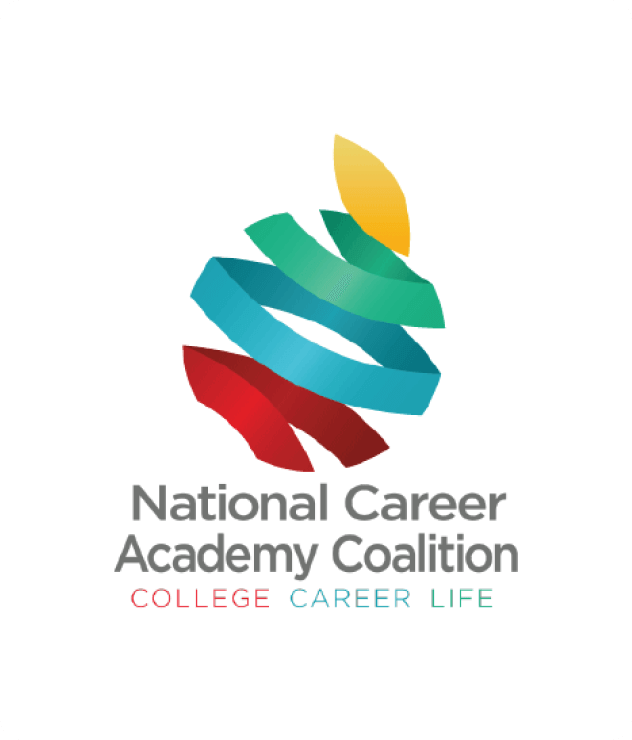Below are resources you can use to assure that you are implementing the model with fidelity and providing the best possible career-connected experience for your students. We will:

Sessions can be delivered in person, hybrid, and virtually. Please contact Dr. Kelly Henderson for more information.
Academy Action Plan – If you are planning your school or district’s academy implementation, this is a great place to start! NCAC will work with school leaders to design a three-year action plan written in a SMART format and aligned with the National Standards of Practice for Career Academies. This action plan will serve as a three-year guide for implementation of quality career academies. This workshop includes the design of a graduate profile and a college and career continuum of experiences for 100% of your students. One and a half day virtual workshop with the leadership team includes follow up, plan edits, and a final copy of the action plan delivered. NSOP 1-10
Academy Mission/Vision/SMART Goals/Use of Data – An NCAC coach will facilitate the identification of key data points that may include attendance, discipline, graduation rates, failure rates, retention rates, student achievement data, and other key leading and lagging indicators. NCAC will assist in the development of SMART goals for each identified area and for all academies. Each academy will also develop mission and vision statements that parallel the developed goals. This will include the creation of a data tracking system aligned with the Graduate Profile and the College and Career Continuum developed in the action planning session.
NSOP 1, 9, 10
Program of Study Development – The most critical exercise when framing a college and career academy is the identification of academy pathways and courses. Ensuring that the selected pathways are fully aligned with local and regional postsecondary offerings and workforce opportunities is essential. Participants will learn the key non-negotiables of undertaking this work and will experience identification and decision-making in real time. The customized training is one to two days based on the needs of the client. NSOP 1, 2, 4, 7
Academy 101 – This training provides an in depth look at career academies and the ingredients that comprise highly successful ones. This work session helps you delve into the rationale behind each academy component, as well as identify strategies to approach the topics. Participants will receive guidance based on the ten National Standards of Practice (NSOP) and learn strategies of how to get started in the right direction. NSOP 1-10
Distributed Leadership – Instructional leaders lead for the overall improvement of teaching and learning. A distributive model shares responsibilities for outcomes, builds a system of support and creates sustainable structures and accountability systems that build the capacity of others to lead. This session includes characteristics of an academy leader and understanding the various academy leadership responsibilities and practices necessary to build highly-effective teams. Participants will discuss and create their own team roles and responsibilities to ensure distributed leadership within their academy. NSOP 2, 3, 4, 10
Team Leader – This session is for academy team leaders to learn how to lead productive, effective teams in order to leverage the strengths of team members and meet the goals of their academy. Team Leaders will begin to create and identify systems, processes, and protocols to maximize common planning time. Participants will leave with the processes, tools, and leadership skills they need to empower team members and improve the effectiveness of the academy team. NSOP 4
Academy Coach/Director – Academy Coaches/Directors are an integral part of the academy structure. This session will assist people in this position to learn how to lead the implementation of academies in their school or district and how to be a liaison between the school and the community. A focus will also be on the National Standards of Practice and leading academies through the certification process. NSOP 2, 4
Project Based Learning for Leaders – If we want students to experience ongoing, daily integration of academy themes and academic subjects and to participate in high-quality project-based learning, there needs to be a systematic plan for this to occur. Implementing project-based learning takes time but it also takes leadership, guidance, and work. This session is for building and district leaders and will address the importance of knowing and understanding PBL, how to encourage implementation, and support teachers efforts’ to implement PBL in their own classrooms as well as part of an academy team. NSOP 3, 7
The Use of Data: The Knowledge and Tools You Need to Effectively Use Data in Schools, Classrooms and/or Counseling Programs – This workshop will help you determine the key data elements and reports that are essential to Academy and student success. Participants will explore demographic data, attainment data, achievement data, student behavioral data, and opportunity data. NSOP 1, 9, 10
Master Scheduling – The implementation of career academies requires special attention to the master schedule development. An academy master schedule needs to shift from the traditional approach to a student-centered approach. The correct schedule allows schools to place students and teachers into cohorts so common planning can be used to meet students’ needs and for the development of interdisciplinary projects. Components of the training include creating time for common planning, a focus on class and student purity, and building a community of practice around master scheduling. Processes for building the master schedule will also be provided. Assistance with master scheduling can be customized based on a school’s needs. NSOP 2, 4, 7
School Counselors Central of Academy Success – This workshop teaches school counselors, principals and district administrators how to implement an effective developmental, comprehensive school- counseling program that aligns with the National Standards of Practice for Academies. This workshop will demonstrate how merging the academy team model with the ASCA National model can accelerate an Academy’s progress in meeting school improvement goals while also developing the social-emotional, career and college ready competencies of all students. As a participant, you will review your school specific data in order to set specific counseling program goals that will help you demonstrate the impact of your school counseling program on Academy and student success. Participants will learn best practices on how implementation of the Academy model supports school counselors in developing highly effective programs, services and interventions for all students. In addition, participants will learn how the Academy model assists with helping students prepare and select pathways to college/postsecondary while still providing alternative schedule options to personalize learning. Participants will leave with documents and tools that will change how you and others view your school counseling program. NSOP 2,3,4
Effective Teaming
This session identifies the stages of development of academic teams, the processes and protocols that support focused and effective meetings and steps to creating academic
and behavior interventions for students that is data driven and personalized for each student. Attendees will understand the processes and protocols that support effective and efficient working meetings and will also write a vision and/or mission statement for their team as well as identifying goals that are aligned with the school and district’s goals. NSOP 2, 4, 9, 10
Freshman College and Career Planning Design –
A well-designed freshman experience sets the foundation for college and career readiness for all high school students. In this one-day workshop, NCAC will facilitate the design of a freshman experience that sets this foundation for your academies. From planning a college fair to career interest inventories, a well-designed freshman experience will prepare your students for the next level. NSOP 2, 7
Business Engagement Structure – Career academies are set apart as a high school reform model with a major ingredient: the involvement of the business community. A critical component of the career academy model is the engagement of the business, college and broader community in the organization and leadership of the academy, as well as helping to provide the experiential components that make the academy model unique and powerful. Educators are often stymied as to how to approach the business community, engage them and retain and expand their interest. This training provides a step-by-step approach to working with the business, college and broader community and includes some planning documents and forms that can be used. The ROI (return on investment) can be approached from both the education and the business side very successfully and strategically. NSOP 2,6,8
Project-Based Learning (PBL) – This rigorous, real-world approach to teaching and learning takes students beyond textbooks and teachers to facilitators of in-depth, engaging learning! It provides students the opportunity to learn the required content and skills embedded in the project while creating and developing solutions to current and potential problems and challenges in their chosen career areas of interest. NCAC facilitates a two-day PBL training for your academy team with touch points throughout the year to ensure successful implementation. NSOP 5,7
Interdisciplinary Project Based Unit Planning – Teachers learn the process of looking deeply at content standards through an interdisciplinary lens to discover common concepts and skills. Once these concepts and skills are identified then universal concepts, or big ideas, begin to emerge. Utilizing the elements from PBL, Teachers leave this session with the skills necessary to design rigorous and relevant interdisciplinary PBL units of study that are standards-based and aligned to the cognitive level demanded of the standards being taught. NSOP 5, 7
Learning Bell to Bell – This session focuses participants on thinking about how to structure the planning and delivery of instruction in any type of schedule. This training takes one class period and develop thinking and knowledge on how to introduce concepts and learning targets in engaging ways, deepening skills and knowledge though designing activities as well as individual and group work and applications of that new knowledge and skills through student designed work. The session also discusses strategies for transitions between activities that keeps students focused and sees the relevancy of the work and pacing of instruction based on assessing where students are at any given moment. NSOP 7
Senior Capstone Design – Capstone projects are designed to encourage students to think critically, solve challenging problems, and develop skills such as oral communication, public speaking, research skills, media literacy, teamwork, planning, self-sufficiency, or goal setting. NCAC will facilitate with teams to design a customized senior capstone. NSOP 7
Portfolio Development – Student portfolios should be created and sustained throughout the academy.NCAC will facilitate with teams in designing a customized portfolio system. NSOP 7
PLC’s and High-Performance Teams – Effective PLC’s share three important characteristics: 1. A focus on learning, 2. A collaborative culture, and 3. A results focused orientation. This workshop will help PLC leaders develop all three. We will explore strategies for cultivating individual and team-level autonomy within a culture of accountability within the PLC. Also discussed, developing meeting agendas, establishing a meeting schedule, facilitating meetings, and keeping records. NSOP 2, 7
Externships – Externships provide academy teams the opportunity to step out of their class- rooms and work directly with their business partners to see and understand their content is applied within that partner’s industry. NCAC will work with teams and business partners to design an externship process and experience. NSOP 5, 6, 7
Student Ambassador Leadership Training (Elementary, Middle, High School) -. NCAC’s Student Brand Ambassador Certification Program ensures that your Ambassadors have the training they need to successfully represent their Academies, High School and district. NCAC delivers the training at your school, making sure the students are prepared in their own environment and in a cost-efficient manner. Choose from a customized one, two, or three-day training package.

Get a jump start in evaluating your current standing and potential areas for improvement.